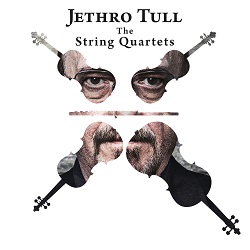Those still out for blood nearly 30 years after Jethro Tull trumped Metallica for the Best Hard Rock/Metal Grammy are sure to be in an uproar over The String Quartets. Rest assured, Tull’s apparent ‘living in the past’ — at least musically — is fully justified on this 12-track classical compilation of their hits. While Tull is far from the first to revisit its iconic discography with the accompaniment of strings (remember Peter Gabriel’s New Blood project from a few years back?), they are probably one of the few groups where applying the classical treatment makes most sense. In other words, they can get away with it given their music was always better suited for the 19th century.
Band leader Ian Anderson remains front and center, guiding his emotive flute alongside the internationally renowned Carducci Quartet. Modifying song titles to reflect actual movements, as opposed to note-for-note instrumental covers, the ensemble tries to freshen things up and at times is successful. Anderson keeps his vocals to a minimum throughout — chiming in more like Mike Pinder a la “Nights In White Satin” with fragments of songs, as opposed to full lyrics. The quartet manages to accomplish a lot with just strings, particularly on “In the Past (Living In The Past),” “Loco (Locomotive Breath),” and “Ring Out These Bells (Ring Out, Solstice Bells).”
“Bungle (Bungle In The Jungle),” playing upon Tull’s biggest chart hit stateside, takes listeners on an unexpected journey as the strings compensate for the animal chants and roars that dominated the original tune. “Aquafugue (Aqualung)” knows better though, diving straight into the six-note melody many still identify with Tull as a whole. More than 35 years later, the song remains a creepy classic, no matter how much the classicism of the players involved attempts to gussy it up.
What’s most surprising here is the missing inclusion of a track called “Brick (Thick as a Brick).” No other Tull-ian romp held more promise as a classical symphony than that two-track opus from 1972. But perhaps that would have been too obvious, hence why it wasn’t included at all.
While not quite up to snuff as say Gabriel’s endeavor, The String Quartets further accentuates the importance of why Tull never conformed to musical standards. That’s why we still listen to them and talk about them in the pantheon of rock heroes today.
~ Ira Kantor




















